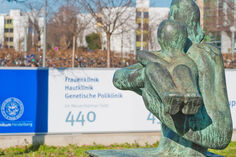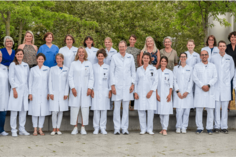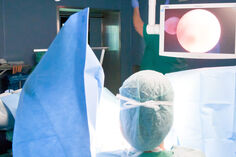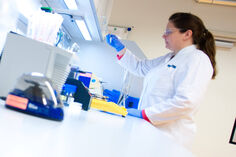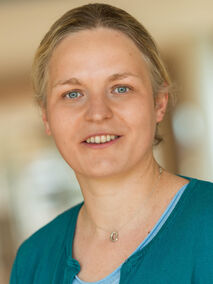AG Krivega
Research Group of Gonadal Differentiation and Embryonic Development
Genetic abnormalities have profound implications for the development of the human embryo. An abnormal number of chromosomes, known as aneuploidy, is linked to spontaneous abortion, and surviving embryos often face challenges with tissue specification, frequently leading to cancer. Our research is focused on understanding the regulatory mechanisms of genome integrity that influence cell specification in the context of human reproduction.
Previous analysis uncovered the involvement of signaling pathways, cell division, and intercellular interaction in cell differentiation during preimplantation development (Krivega et al., 2014, 2015a, 2015b). Recently, significant attention has been directed towards the role of genome quality within a cell. It has been observed that similar gene expression changes can trigger cellular stresses and defense mechanisms across different types of aneuploidy, often interfering with cell differentiation. Recent studies have described the deregulation of pathway networks in cells under genotoxic stress (Krivega, et al., 2021, 2022, 2023a). Identifying the origins of the observed phenotypes could potentially contribute to understanding the underlying molecular causes of infertility.
In our clinics, we encounter patients with various infertility phenotypes, many of which have unknown genetic causes and thus classified as idiopathic cases. The most severe cases belong to the group of Differences of Sex Development (DSD), which includes individuals with Turner syndrome (complete or partial loss of the second sex chromosome: 45, X0) and Swyer syndrome (phenotypically female, genetically males: 46, XY). These syndromes are characterized by Dysgenetic Gonads (DG), a lack of mature germ cells, and high risk of tumors. Also, the genetic etiology of most cases of male idiopathic nonobstructive azoospermia (NOA) remains unidentified. Consequently, proposing appropriate therapeutically treatments to address infertility-related phenotypes remains a challenge.
Our studies have revealed that infertile individuals share common underlying molecular mechanisms associated with genotoxic stress and altered Androgen Receptor expression (Krivega et al., 2023b, Zimmer et al., 2024). We aim to further explore the role of specific signaling cascades that translates signals from degenerating genome, affecting physiology of cells. This contributes to the Genotoxic Stress Phenotypes (GSP) via autophagy and the innate immune response that we previously linked to human infertility. We address the relevance of GSP to gonadal dysgenesis, cancerogenesis, and infertility in general. To achieve this, we measure specific transcriptional targets, analyze the proteome in primary patient samples, and develop new in vitro study models.
With our research, we offer novel insights into understanding pathological phenotypes linked to infertility, opening up additional opportunities for universal diagnostic and treatment approaches.
Publications
J. Zimmer, L. Mueller, P. Frank-Herrmann, J. Rehnitz, J.E. Dietrich, M. Bettendorf, T. Strowitzki, M. Krivega. Low androgen signaling rescues genome integrity with innate immune response while reducing fertility in humans. Cell Death & Disease, Nature Publishing Group (2024); https://doi.org/10.1038/s41419-023-06397-5
M. Krivega, J. Zimmer, A. Slezko, P. Frank-Herrmann, J. Rehnitz, M. Hohenfellner, M. Bettendorf, M. Luzarowski, T. Strowitzki. Genomic instability in patients with sex determination defects and germ cell cancer. Cell Death Discovery journal, Nature Publishing Group (2023b); https://doi.org/10.1038/s41420-023-01470-6
M. Krivega, Z. Storchova. Consequencies of trisomy syndromes – 21 and beyond. Trends in Genetics, Cell Press (2023a); https://doi.org/10.1016/j.tig.2022.11.004
M. Krivega, C. Stiefel, Z. Storchova. Consequences of chromosome gain: A new view on trisomy syndromes. American Journal of Human Genetics, Cell Press (2022); https://doi.org/10.1016/j.ajhg.2022.10.014
M. Krivega, C. Stiefel, S. Karbassi, L. Andersen, N. Chunduri, N, Donnelly, A. Pichlmair, Z. Storchova. Genotoxic stress in constitutive trisomies induces autophagy and the innate immune response via the cGAS-STING pathway. Communications Biology, Nature Publishing Group (2021); https://doi.org/10.1038/s42003-021-02278-9
M. Krivega, M. Geens, B. Heindryckx, S. dos Santos Ribeiro, H. Tournaye, H. Van de Velde. Cyclin E1 plays a key role in balancing between totipotency and differentiation in human embryonic cells. Molecular Human Reproduction, Oxford press (2015b); https://doi.org/10.1093/molehr/gav053
M. Krivega, W. Essahib, H. Van de Velde. WNT3 and membrane-associated beta-catenin regulate trophectoderm lineage differentiation in human blastocysts. Molecular Human Reproduction, Oxford press (2015a); https://doi.org/10.1093/molehr/gav036
M. Krivega, M. Geens, H. Van de Velde. CAR expression in human embryos and hESC illustrates its role in pluripotency and tight junctions. Reproduction (2014); doi: 10.1530/REP-14-0253
Leitung
Team
Doktoranden/-innen
-

Lara Müller
Chemisch-Techn. Assistentin
-

Jutta Zimmer
